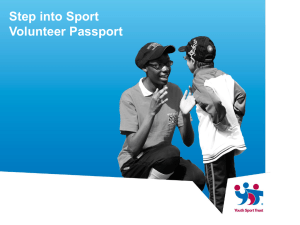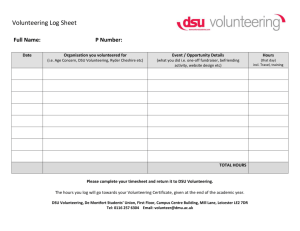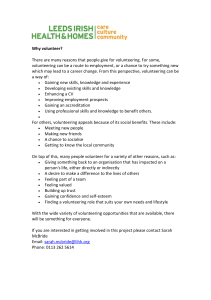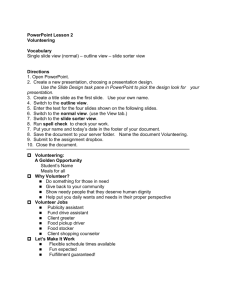Models of collaboration - Royal College of Psychiatrists
advertisement
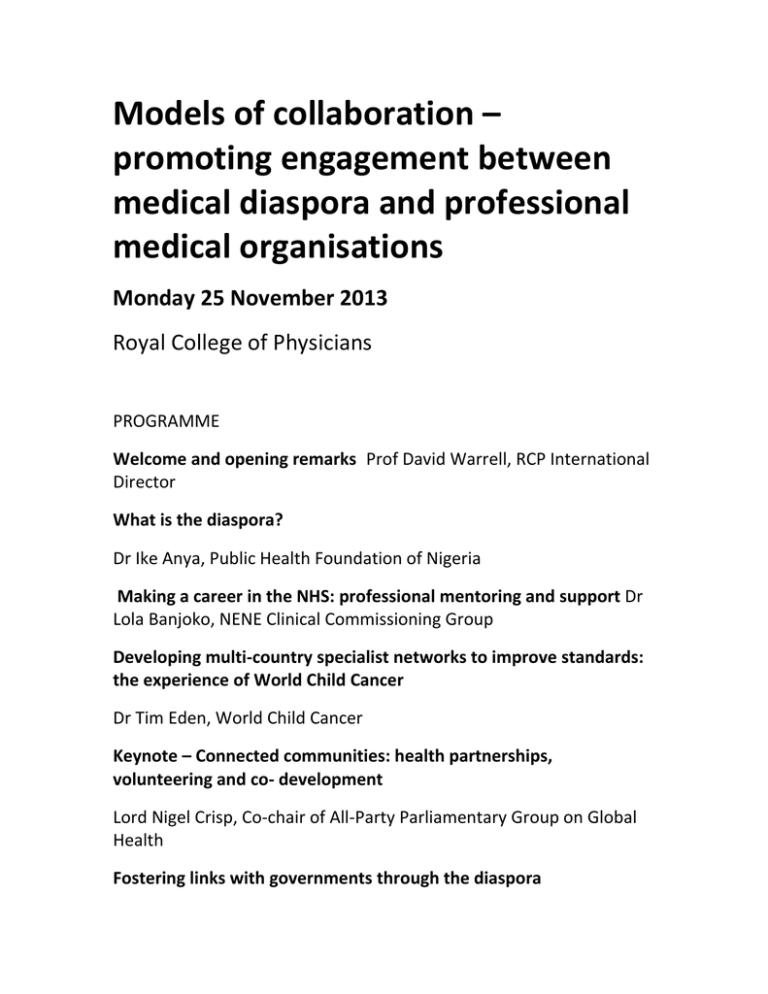
Models of collaboration – promoting engagement between medical diaspora and professional medical organisations Monday 25 November 2013 Royal College of Physicians PROGRAMME Welcome and opening remarks Prof David Warrell, RCP International Director What is the diaspora? Dr Ike Anya, Public Health Foundation of Nigeria Making a career in the NHS: professional mentoring and support Dr Lola Banjoko, NENE Clinical Commissioning Group Developing multi-country specialist networks to improve standards: the experience of World Child Cancer Dr Tim Eden, World Child Cancer Keynote – Connected communities: health partnerships, volunteering and co- development Lord Nigel Crisp, Co-chair of All-Party Parliamentary Group on Global Health Fostering links with governments through the diaspora Visits from overseas MoH officials: linking the diaspora back to opportunities at home. What role for the Colleges? Dr John Howard, Chair of International Forum, AoMRC NOTES FROM CONFERENCE LORD NIGEL CRISPGLOBAL HEALTH PARTNERSHIPS -local solutions -education and training - Learning Turning the world upside down - http://www.ttwud.org/ learning from LMIC .-doing things differently -One of key areas can be empowering women eg Bangladesh Project BRAC - Importance of multi-sectoral connections -Health and education -human resources TTWUD – examples of education, employment, health “Improving health at home and abroad” http://www.rcpsych.ac.uk/pdf/Improving%20Health%20at%20Home%20and%20Abroad %20-%20Final%20Report.pdf All party parliamentary group on mental health Volunteering is a way of improving back in UK -more innovative solutions - scale up -professional -local, regional and national to create an energy Also sharing benefits to countries -Sharing innovations - leadership development - international relationships Local - training from partnerships national applications UK -sharing experience - innovation -eg community mental health workers in Lambeth Uganda “tree of life” Butabike Sierra leone –approach to TB-KINGS COLLEGE London Volunteering - should be encouraged NHS partnerships All talents involved Supply, mobilise and develop Supportive employers Less fragmentation Global health expertise valued More volunteers eg schools Better trained volunteers Volunteering in UK policy framework needed Volunteering must be professional not amateur. Need to develop themselves and improve standard Code of conduct needed Human resources policy Follow up afterwards HEALTH EDUCATION ENGLAND –can be focus of volunteering and LETBs DFID grants Health partnerships Scheme Second phase may be 2015 Government – continue pension contributions –eg 2 years Promote through GMC, Colleges, NHS, voluntary sector Lot of opportunities Principles of Co-development Patchy support for volunteers in UK Some strong supporters eg Frimley and Addenbrookes –good environment to promote volunteering Embassy/High Commissions might have role AOMRC- International forum of the Academy of medical royal colleges John Howard Incorporates royal collages Nursing and paramedical colleges Affiliates THET GMC VSO BMA Dept of health Health care UK - https://www.gov.uk/government/organisations/healthcare-uk RSM Function is - education - training - quality standards and quality assurance - accreditation of local exams MTI programme for 2 years for specialist UK training Need for mentoring for MTI programme doctors 6 challenges of volunteering - time –out formal recognition of volunteers and volunteering Fragmented environment of volunteering Monitoring, evaluation, research -information, training, support for volunteers additional expenditure employment and return to posts Can build a business platform for volunteering Collaborative work with DoH Global Health Health Care UK and FCO Need to scope international activities of all colleges Activity should be auditable especially as colleges subject to charities commission 2014 large scoping exercise of all colleges Mention of Iraq work as example of good practice Exams –colleges can support validation of local exams Lot of good work is now intercollegiate Diaspora groups can ensure sustainability ZAMBIA PROJECT ZUKHWA –Healthworkforce alliance All organisations from UK working in Zambia join in terms of dealing with Zambian government University’s, NGOs,professional groups, not for profit, diaspora group Alliance to facilitate work in Zambia . Energises process Alligns activities to needs of Zambian government , workforce planning, service delivery Encourages cooperation between UK and international partners High standard Co-development included Reduce impact of multiple UK partners in country Similar project in Uganda -annual conference -website -blog-HIFAZambia -mentoring ,encouragement -Zambians come to Uk for conference Conference –about quality assurance, diaspora ,maternal health Importance of personal connections Lessons –good will, teaching and expertise valued Challenges -duplication of activity -standard -not government needs -tendancy to say to things -perverse incentives eg salary support -workshops and backfill Zambia alliance in place for 4 years Uganda Alliance Similar to Zambia model. -HR -Health sytems -MDG Opportunities for learning , development and research Members agree to share their experience , expertise, conferences. Activities –coordinated with M.O.H. , Uganda led Develop expertise and strengthen systems Importance to have exit strategy from beginning Development map can be modeled to poorest communities Quality assured Evaluation Some challenges- regulation, registration Benefits - focal point -projects requested by Uganda Govt Better coordination Diversity of international support Efficiency and sustainability DIASPORA Advantages and disadvantages Patchy knowledge and may be out of date, risk of being resented Talk by Steve Allen RCPCH International officer Projects in Gambia and Papua New Guinea Junior doctors Intercollegiate group Case study example given – issues of interpreter, fgm, advocate, human rights, child protection Global Health Global Health agenda Need to understand whole world Paper – Hall et al GLOBAL HEALTH in UK Postgraduate medical training Lancet 2012 Surge in interest in Global Health Enables issues such as non acceptance of FGM Global health agenda for UK –panel being established to look at development of a body of knowledge needed in Uk on global health Dr Lola Banjoko Talk on NHS volunteering and he activities back in Nigeria Has invested in some services there which allow her to have a say in services Nigeria. POSTER PRESENTATIONS These were presented as 5 minute presentations - - - - - - Uganda Diaspora Foundation –mental and physical well being. Capacity building, expert reference group for Uganda mental health. HEARTSOUNDS –peer support Programme Supervision on line and peer to peer Training acceptance and commitment therapy-nurses at frontline Violence management project Wellbeing with NCD alliance UK Pakistan Public Health not mental health but interesting HEP C huge issue in Pakistan. 3% of UK population vs 0.67% rest of population. One of largest groups in UK. 10 % rate in Pakistan. Highest rate of injections per person in world -13 injections per person per year Public Health Foundation of Nigeria –not mental health Zimbabwe Health Training support –training and education in Zimbabwe , TOTs.FRIENDSHIP BENCH project. In Mbare project for community workers to screen for depression and refer on Hands in hand for Syria –not mental health- Middle income country now has collapsed health system. 15,000 doctors have left Syria. 30% of hospitals are destroyed. 27% damaged. Large number of IDPs Royal Society of Medicine – Head of global health RSM –awareness raising, facilitate engagement, convener, alerts, GH activities and events . Volunteers support –need more structured and programme with Save the children, ethics, student partnerships Royal College of OBS and gynaecology -not mental health SUMMARY PLAN AT END -volunteering –absorbed into mainstream ministry policy -this conference will feedback into another conference Limitations of this conference is not a widespread diaspora representation Organisations represented ARC Health – Promoting clinical and educational development in Sri Lanka through the formation of sustainable collaborative healthcare related projects –includes mental health. www.achieverealchange.org e-mail info@achieverealchange.org Doctors for Africa DFA – NGO in Rwanda, Uganda and Zimbabwe East African Healthcare Forum- peer to peer, institutional links Iraq Mental Health Forum UK (IMHF-UK) –mental health –not present. email sdhumad@nhs.net Wessex Deanery – South Sudan, Ghana, Nepal –mental health. www.wessex.hee.nhs.uk e-mail John.acres@wessex.hee.nhs.uk Nigeria Health Care Project –mental health www.nhcp.org.uk e-mail nhcp@btinternet.com Hand in hand for Syria The Zambia UK Health Workforce Alliance-mental health. www.zuhwa.com e-mail zambiaukalliance@gmail.com Uganda UK Health Alliance –mental health e-mail Maura.buchanan@ntlworld.com Department of Community Health & Primary Care –Nigeria www.cmul.edu.ng Royal College of Paediatrics and Child Health (RCPCH)- child West Africa, Ghana, Myanmar, South Sudan, Palestine Healthy Nations Foundation- Eastern Africa focus Zimbabwe Health and Training Sector (ZHTS) med student led Global Health (GH) at the RSM Sudanese Medical Association SMA-mental health www.smaukandireland.org Uganda Diaspora Health Foundation www.ugandadiasporahealthfoundation.org e-mail moses.mulimira@hotmail.co.uk World Child Cancer SUD World Project –South America –Mental health .
